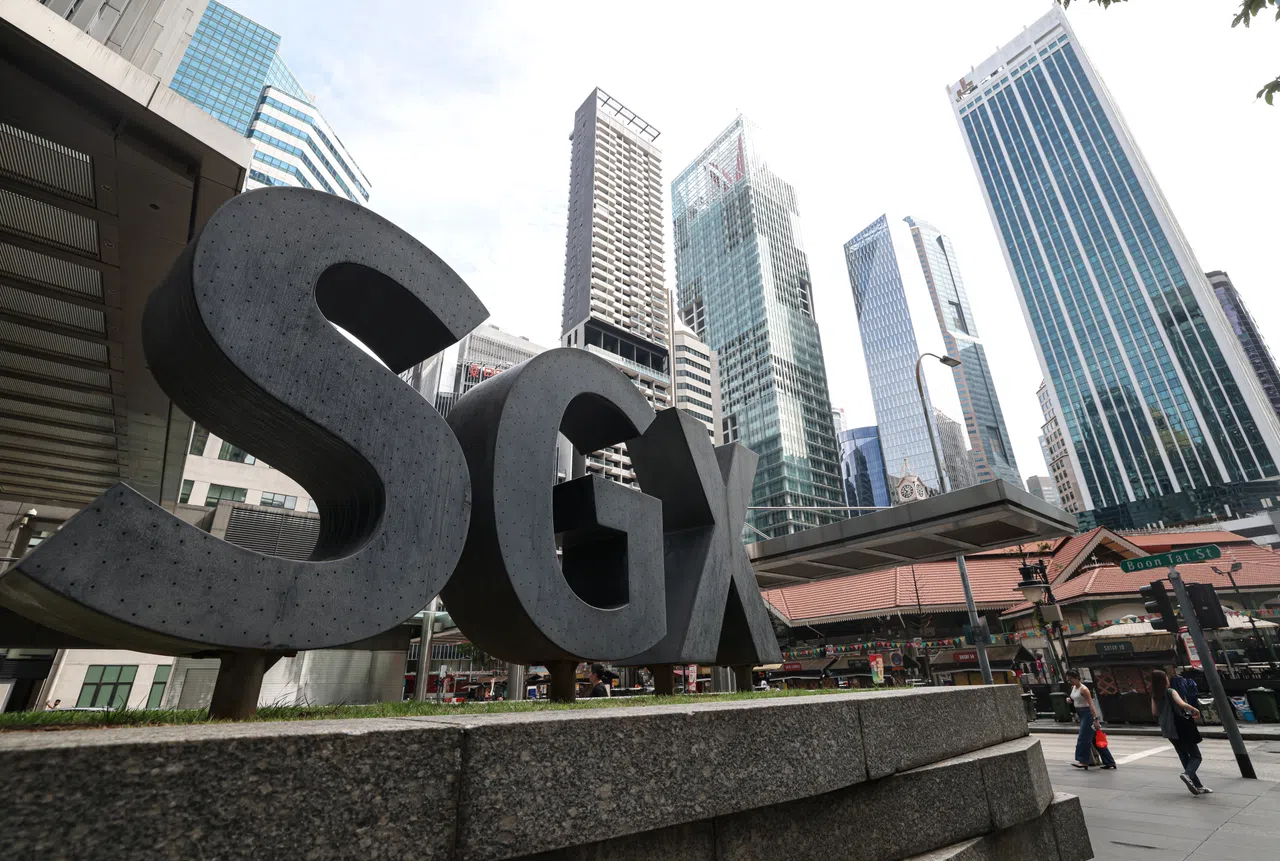OVER the five trading sessions from Jan 31 to Feb 6, institutions were net sellers of Singapore stocks, leading to net institutional outflow of S$169 million. This brings the net outflow for the 2025 year to Feb 6, to S$697 million.
Institutional flows
The stocks that led the net institutional outflow over the five sessions included Seatrium, DBS, Mapletree Industrial Trust, Sats, OCBC, UOB, Venture Corporation, Keppel Reit, Jardine Matheson and Keppel.
Meanwhile, stocks that led the net institutional inflow included Singtel, Wilmar International, Singapore Exchange, Hongkong Land Holdings, Japfa, Singapore Airlines, Genting Singapore, Keppel DC Reit, Yangzijiang Financial Holding and Rex International Holding.
Consequently, during the period, real estate investment trusts (Reits) and industrials experienced the highest net institutional outflow, while telecommunications and consumer non-cyclicals saw the most net institutional inflow.
Share buybacks
During the five sessions, just a handful of primary-listed companies conducted buybacks with a total consideration of S$130,882.
The seasonal decline in buyback filings is due to the heavy schedule for the release of FY24 financial statements in February. As best practice, companies should refrain from buying back their shares during the one month immediately before the full-year financial statements, and two weeks immediately before quarterly financial statements.
BT in your inbox
Start and end each day with the latest news stories and analyses delivered straight to your inbox.
The on-market share buyback consideration tally for primary listed companies in January amounted to S$111 million, led by OCBC, Sembcorp Industries, Singapore Technologies Engineering, Seatrium and Venture Corporation.
Director transactions
More than 50 director interests and substantial shareholdings changes were filed for 30 primary-listed stocks during the five trading sessions. Directors or CEOs filed 14 acquisitions and no disposals, while substantial shareholders filed five acquisitions and five disposals.
CapitaLand Ascott Trust
CapitaLand Ascott Trust (CLAS) is a stapled group consisting of CapitaLand Ascott Real Estate Investment Trust and CapitaLand Ascott Business Trust.
CLAS is the largest lodging trust in Asia-Pacific with an asset value of S$8.8 billion as at Dec 31. It is managed by CapitaLand Ascott Trust Management and CapitaLand Ascott Business Trust Management (the CLAS managers), both of which are wholly owned subsidiaries of CapitaLand Investment.
On Feb 3, both the chairman and CEO of the CLAS managers increased their direct interest in the stapled trust. Chairman and non-executive independent director Lui Chong Chee acquired one million stapled securities at an average price of S$0.893 per unit, increasing his direct interest from 0.03 per cent to 0.05 per cent.
On the same day, CEO and executive non-independent director Serena Teo purchased 500,000 stapled securities at S$0.895 per unit, increasing her direct interest from 0.01 per cent to 0.02 per cent.
On Jan 27, CLAS reported that its H2 FY24 (ended Dec 31) gross profit increased 8 per cent from H2 FY23. Lui emphasised CLAS’ commitment to delivering stable distributions to stapled security holders. He also highlighted that the strong performance in FY24 was driven by active portfolio reconstitution, operational maximisation and asset enhancements.
CLAS completed over S$500 million in divestments and about S$350 million in accretive investments in 2024. The proceeds were used to reduce debt and fund asset enhancement initiatives (AEIs). Lui also affirmed the focus on strengthening operating performance to enhance core distributions.
He has been the chairman of the CLAS managers since April 2024, and has held several key positions throughout his career.
He was the managing director and CEO of Far East Orchard, previously served as the group CFO at Raffles Medical Group and held senior roles at CapitaLand and its subsidiaries. Before that, he was the managing director and senior vice-president at Citicorp Investment Bank (Singapore).
Teo has been the CEO of the CLAS managers since 2022. She previously served as deputy CEO and held various leadership roles at Ascendas Funds Management, Ascendas Services and Ascendas Land. Her experience also includes positions at EDB Investments and Chartered Semiconductors Manufacturing.
With the FY24 results, Teo highlighted that while the CLAS portfolio reconstitution strategy may cause short-term income fluctuations, it will enhance long-term value for stapled security holders.
She also maintained that despite macroeconomic uncertainties, CLAS remains optimistic about lodging demand and is focused on strengthening its portfolio and earnings through geographic diversification, varied lodging asset classes and disciplined capital management.
As at Dec 31, CLAS’ international portfolio includes 100 properties with more than 18,000 units in 45 cities across 16 countries in Asia-Pacific, Europe and the United States. Most of these properties operate under the Ascott, Somerset, Quest and Citadines brands.
For its FY24, CLAS’ revenue per available unit (RevPAU) increased 5 per cent from S$148 to S$156. Total core distribution for H2 FY24 increased 5 per cent from H2 FY23 to S$117 million, bringing the FY24 core distribution per stapled security (DPS) to 5.49 Singapore cents, 1 per cent higher than FY23. The core DPS excludes non-periodic items from realised exchange gains on cross currency swaps and foreign currency loan repayments.
The CLAS managers highlighted that stronger operating performance, acquisitions, and completed AEIs helped offset the impact of divestments, ongoing AEIs, higher financing costs, and depreciation of most foreign currencies against the Singapore dollar.
CLAS maintains a proactive and prudent capital management strategy with an average debt cost of 3 per cent per annum as at Dec 31. Its gearing is 38.3 per cent, well below the 50 per cent limit set by the Monetary Authority of Singapore (MAS), with CLAS maintaining around S$1.6 billion in cash and available credit facilities.
CapitaLand India Trust
CapitaLand India Trust Management (CLINTM) is the trustee-manager of CapitaLand India Trust (Clint). As at Dec 31, Clint’s assets under management totalled S$3.7 billion.
Its portfolio comprises 10 world-class IT business parks, three industrial facilities, one logistics par, and four data centre developments in India. These properties span a total completed floor area of 21.9 million square feet, distributed across Bangalore, Chennai, Hyderabad, Pune and Mumbai.
On Feb 5, CLINTM chairman and non-executive non-independent director Manohar Khiatani acquired 500,000 units at S$1.03 per unit. This was his first acquisition since he was appointed chairman of CLINTM in January 2023. He previously held several senior leadership roles, including senior executive director at CapitaLand Group, deputy group CEO at Ascendas-Singbridge, president and CEO at Ascendas, and CEO at JTC Corporation. Additionally, he held various roles at the Economic Development Board.
On Jan 15, Clint signed a long-term agreement with a leading global hyperscaler for one of Clint’s data centres under development.
Khiatani emphasised India’s importance as a core market for CapitaLand Investment (CLI), highlighting strong growth potential in data centres.
He noted that the milestone agreement with the leading hyperscaler showcased CLI’s expertise in delivering world-class data centre solutions and that the surge in demand for data storage and processing in India, driven by digital transformation and cloud computing, supports Clint’s growth.
On Jan 27, Clint reported that its FY24 (ended Dec 31) distribution per unit (DPU) increased 6 per cent from FY23, to 6.84 Singapore cents. The net property income (NPI) grew by 16 per cent in Indian rupee terms and 14 per cent in Singdollar terms, driven by recent acquisitions, higher rental income, and positive rent reversion.
As at Dec 31, Clint achieved a committed portfolio occupancy of 95 per cent, excluding the logistics park and acquisitions in 2024. Its gearing ratio was 38.5 per cent as at Dec 31, and after including cash and cash equivalents of S$135 million, the gearing was 36.6 per cent.
This means Clint has a debt headroom of about S$1 billion based on the gearing limit of 50 per cent by the MAS.
Mapletree Logistics Trust
Mapletree Logistics Trust (MLT) is managed by Mapletree Logistics Trust Management (MLTM), a wholly owned subsidiary of Mapletree Investments. MLT invests in a diversified portfolio of quality logistics real estate in Singapore, Australia, China, Hong Kong, India, Japan, Malaysia, South Korea and Vietnam.
On Jan 31, MLTM non-executive chairman and director Lee Chong Kwee bought 100,000 units of the Reit at S$1.21 per unit.
This increased his direct interest in MLT to 300,000 units. His preceding acquisition was on Jul 30, with 134,000 units at S$1.31 per unit.
Lee holds a position on the board of directors at Mapletree Investments, serves as the chairman of its transaction review committee, and is a member of its executive resource and compensation committee.
His past roles include that of Asia-Pacific CEO of Exel (Singapore), non-executive chairman of Jurong Port and corporate adviser to Temasek.
On Jan 21, MLT reported Q3 FY24/25 (ended Dec 31) distributable income of S$101.3 million and DPU of 2.003 Singapore cents, which was down 9.7 per cent and 11.1 per cent from Q3 FY23/24.
This was on the back of Q3 FY24/25 gross revenue declining 0.9 per cent from Q3 FY23/24 to S$182.4 million due to lower contributions from China, divested properties and currency depreciation.
This was partially offset by stronger performance in Singapore, Australia and Hong Kong, and recent acquisitions. Net property income declined 1.4 per cent to S$157.2 million.
However, on a constant currency basis, revenue would have increased 0.6 per cent, and net property income would have remained flat.
The MLTM CEO also said that portfolio occupancy improved to 96.3 per cent with positive rental reversions of 3.4 per cent achieved in the quarter.
The writer is the market strategist at Singapore Exchange (SGX). To read SGX’s market research reports, visit sgx.com/research.







